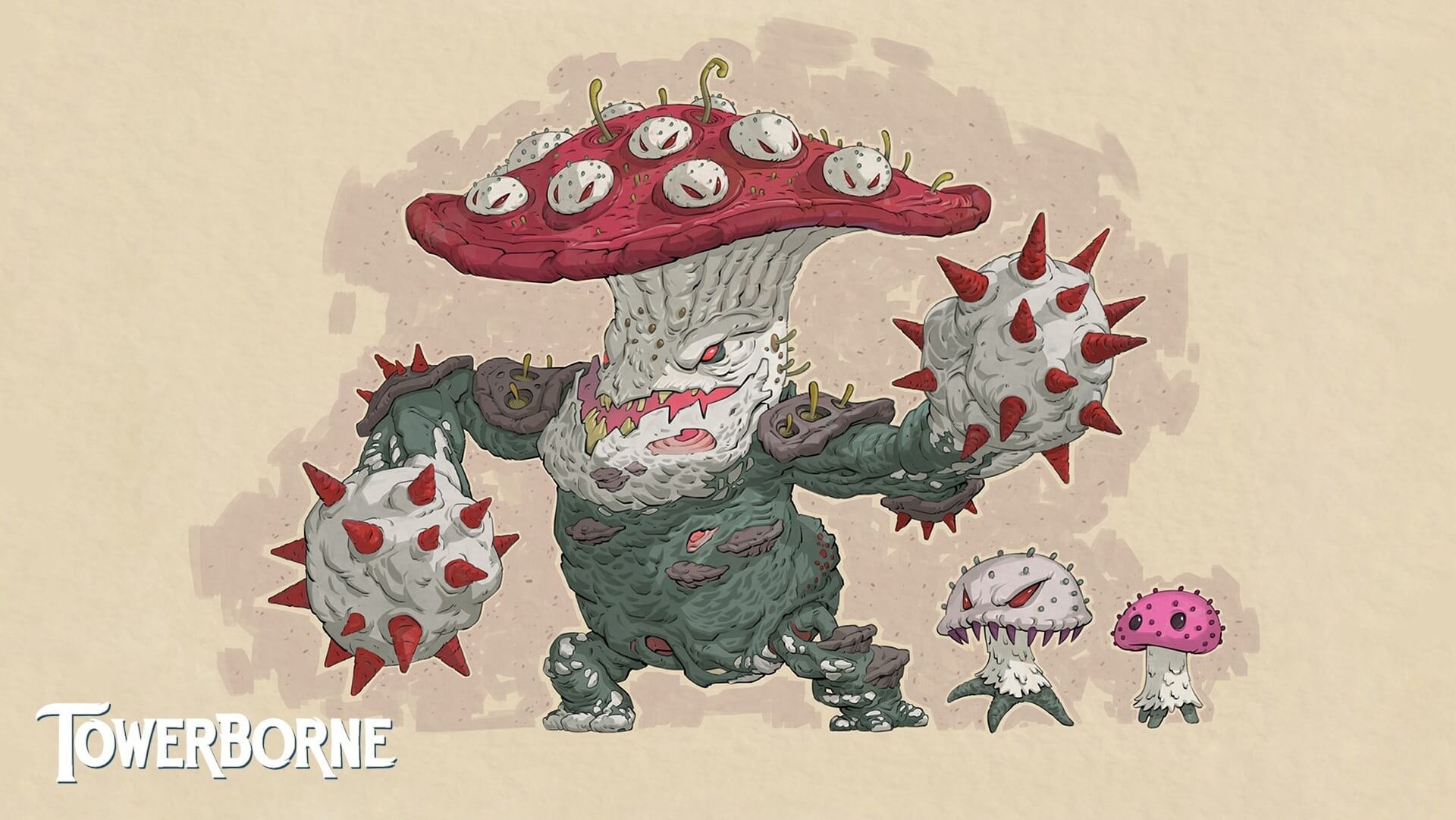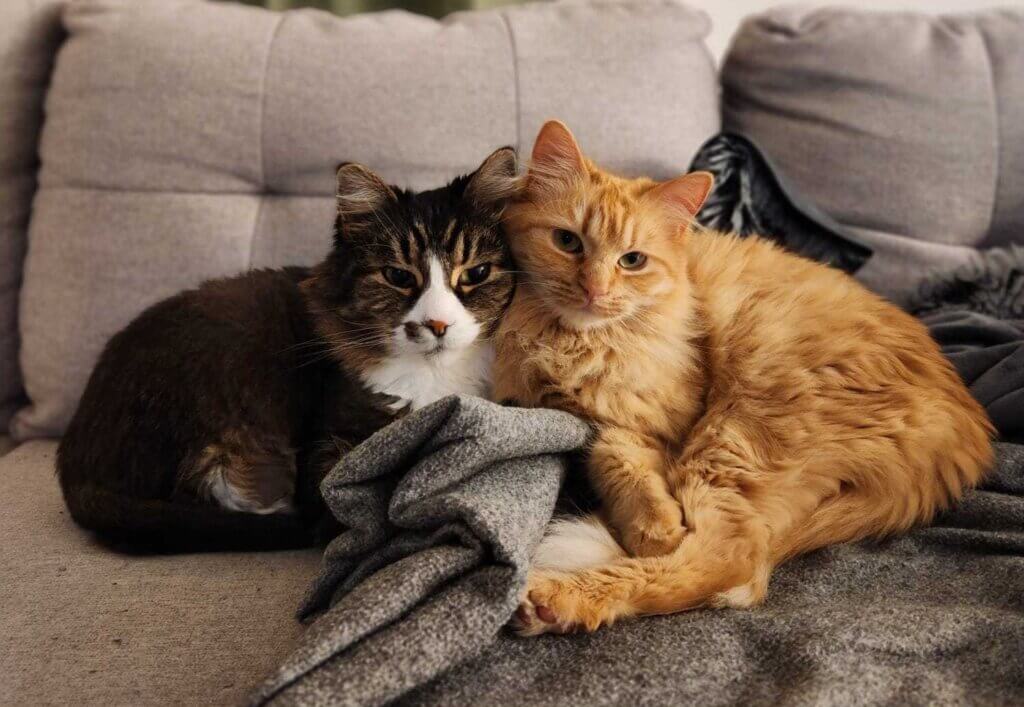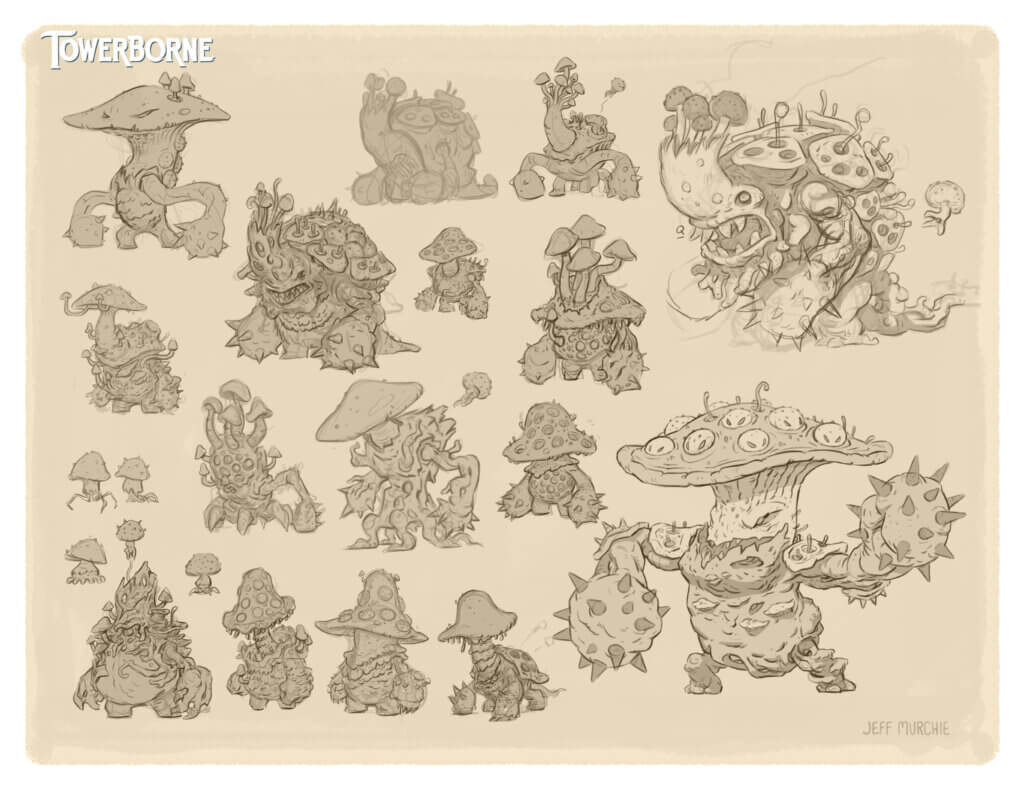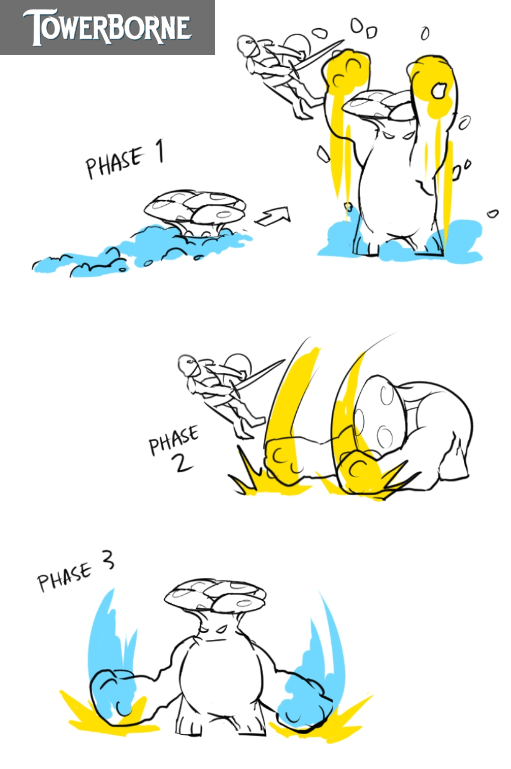
Venturing outside the Belfry can prove dangerous with many creatures causing havoc across the world of Towerborne. One creature in particular is the all-powerful Truffleclub.
From Art to Animation to Combat Design, creating enemies is an effort that travels across game development disciplines. We had the opportunity to sit down with Lead Combat Designer Isaac Torres, Senior Combat Designer Aviva Schecterson, Principal Animator Joseph Garrahan and Lead Concept Artists Jeff Murchie from Stoic Studio to answer some questions and dive into the process of bringing an idea to life!
Hello! And thank you for your time! Let’s go ahead and plunge into some questions, starting with your background! Tell us a bit about yourself!
Isaac: Hello! I’m Isaac Torres, Lead Combat Designer at Stoic. I have a strong love for everything combat-focused and have been working in the game industry for about a decade now. Even though my career has been focused on fighting games for most of my time in the industry, I was immediately starstruck when I saw Towerborne for the first time. I knew in my heart that this was a game that I had to work on and I’m glad to have been given the opportunity to lead a wonderful group of Combat Designers to help bring this game to life.
Aviva: I’m Aviva, Senior Combat Designer at Stoic where I get to work on all our enemies. I attended DigiPen for my bachelor’s in game design and worked on tabletop games for a few years. When I was at Amazon, I worked on both Crucible and New World. I’ve been at Stoic for just over three years now and have really enjoyed spearheading our AI combat. Outside of work, I have two gorgeous cats that sit on me while I read or play games.
Joseph: I’m Joseph, Principal Animator at Stoic. I’ve been an animator since 2000 when I got to animate a TV commercial and studied animation at Savannah College of Art & Design. I’ve worked on movies, TV series and videogames. Most recently I was at Naughty Dog working on Uncharted and The Last of Us Part II”. I’m a big anime and video game fan, always loved beat ‘em up games. So, when the opportunity came to work on a project like this, I couldn’t resist.
Jeff: Hi, I’m Jeff, the Lead Concept Artist at Stoic, and me and my small team have the privilege to visualize the characters within Towerborne’s lore. I’ve been in the industry since the early 2000s and got my start with LucasArts. Since getting my foot in the door I have worked on a variety of projects, most recently Crash Bandicoot: It’s About Time, the Spyro Reignited Trilogy and bringing toys to life for the Skylanders series. I have been with Stoic for over three years and enjoy every minute exploring the visual concepts for our game. Am I supposed to say something personal? I love playing basketball and Ultimate Frisbee…. when I get the chance.
Let’s go back to the beginning. What was your experience when creating Truffleclub for the first time?
Jeff: As the concept artist for Truffleclub, I saw it as an evolving process. The team knew we wanted a creature that would fit into the theme of a fungi forest. A mushroom aesthetic was the clear direction which I explored with a variety of sketches. One of the few requirements for this boss at the start was that he was a smasher. One of the tricky aspects of character development (specifically enemies) in Towerborne is striking a balance for a creature that is both frightening and whimsical in appearance. We did not want designs that just feel scary and intimidating. I love watching this character develop past its visual concept. The character model, animations and VFX added so much power and personality to Truffleclub.
Aviva: My introduction to the Truffleclub was seen on the development whiteboard with other minor characters. I was really interested in seeing how the big boss and the small fodder could feel like they were functionally in the same family and provide very different gameplay for players.
Joseph: I was involved since the beginning of the concept phase, and always saw the potential to create wacky scenarios with him, such as parachuting mushrooms and drilling into the ground.
Isaac: My experience was different: I joined Stoic when Truffleclub was already in development. I was astounded by the scale of the characters and the personality of all its animations and movements. I love the creativity in its design and the team did a fantastic job making this character come to life.
In order to achieve compelling and interesting enemy movement, one must be inspired by the abnormal and unconventional. From where do you draw creativity when animating complex characters such as Truffleclub?
Joseph: I’ve always been fascinated by anime that pushes the limits, such as Gurren Lagan and Studio Trigger’s work. Never take the easy way to do choreography. Wild things can happen in one second. It makes everything more difficult to animate, but it’s more satisfying in the end.
How do you begin the process of bringing an enemy to life? Do you sit down and discuss how the character moves? Do you give it personality? A backstory? Other than the concept art, you are basically starting with a blank canvas.
Isaac: As the Lead Combat Designer on the project, I have to think about the bigger picture of combat for every enemy we create. What role does the character fit? Are there any twists we can add to an enemy’s move set that makes the game more fun to play? Sometimes the archetype is something that the design team is already settled on. Sometimes we’ll get various pieces of concept art that inspires us, and we’ll build a move set off that.
It’s important to me to ensure that people who are not working on the character have an opportunity to help shape its gameplay. Because of this, we often start with a blank canvas of ideas. Since we generally know which biome an enemy will appear in, this also helps inform its design, or at least gives us something to work off of right from the start. Overall, the process itself is super fun and is one of my favorite parts of the project. Everyone’s creativity really shines, and it’s great to experience.
Aviva: I like to start with personality and the purpose of this enemy. For me, those inform each other and can then inform other mechanics and behavior patterns. For Truffleclub, we wanted them to feel imposing and punchy, plus also try out our new “status effect” tech by letting them do poison damage. We also had this drawing for potential phases with notes (note that the fight doesn’t have this phase structure anymore, but the burrow move, forward fist slam, and side fist slams became real moves and still exist).
Joseph: We usually start with a basic concept, such as the size of the character and what the main goal is for the game, maybe a weapon we want to try out. After that, I start thinking about what kind of motion would be best for it, such as martial arts, boxing, acrobatic, etc. Sometimes we create an animation depicting the basic motions, either in 3D or with 2D drawings. Our Animation Director, Lance Myers, created an awesome 2D animatic for Truffleclub. The backstory can be defined earlier, but sometimes naturally comes after exploring these options. On Truffleclub, we settled on an ape-like motion, swinging his weight around.
Were there any design challenges?
Aviva: Yes. Truffleclub was our first big boss who became playable early in pre-production. As games go, there are many combat and iteration changes, so the attack patterns and encounter pacing have to keep up not only with combat changes from the player side, but also tech updates on our AI side. This character has also been on each version of our AI tech, so they’ve been taken apart and put back together multiple times.
Joseph: I initially did the walk cycle as a biped, but a team member mentioned it looked like “a folk in a monkey suit.” That pushed me to explore more interesting locomotion and ended up with a quadruped ape-like walk cycle. In the end, that influenced the overall personality.
Isaac: It’s always a huge challenge creating the first boss of a game. There’s so much exploration that occurs on an enemy like this that basically shapes the direction of the rest of the game. Part of the challenge is finding the fun, and as a combat team, we always make sure that’s our priority. Sometimes what works early on in development may require fundamental changes later due to various advancements over time. That is honestly the biggest challenge. As we develop the game, we are also growing as a team. Sometimes we’ll have to go back to older content and elevate it to the quality of our later content because we’ve learned so much.
It is worth noting that Truffleclub isn’t alone in this fight! This created an additional challenge, since you never want an encounter to feel like it’s too overwhelming. Finding that sweet spot, whether it is a 1-on-1 or a 4-on-1 scenario was critical throughout development. How many enemies is too many? Do we need to add unique behaviors? What types of interactions with the player maximize fun while adding an interesting challenge?
What was your favorite part when animating Truffleclub?
Joseph: The burrowing underground, since I was able to fully squash and stretch the character rig to extremes and create interesting smear shapes.
Taking Truffleclub’s animation, the team must consider how Truffleclub interacts with up to four players coming at it on all fronts. Tell me about the animation process of battle with live gaming on different weapons versus pre-scripted AI.
Joseph: I just need to create lots of attacks that target different ranges and scenarios: crowd control, single direction, etc. The designers then make sure these attacks trigger when needed.
Isaac: Great transition. As a Combat Designer, this is a continuous challenge. Not only do we have to ensure that combat feels good from a 1-on-1 perspective, but we also always must consider scenarios with up to four players. Playtesting is key. We constantly go back and forth with animation on every aspect of the character. Does Truffleclub move too slow? Does it have ways to escape when four players are surrounding it with a barrage of attacks? Are the attacks obvious enough to inform players that a big move is about to be done? As designers, we try to identify these scenarios as early as possible. Because of this, we’ll always ask animators to give us stubby versions of animations so that we can put things through their paces and adjust where necessary.
What do you think Truffleclub does in its time off?
Aviva: I think Truffleclub enjoys conducting mushroom concerts where they create symphonies with their mycelial network.
Joseph: Probably spawns smaller mushrooms deep underground while sleeping.
Isaac: Hmm, since Truffleclub likes to burrow underground, maybe it is creating an elaborate transportation system for its buddies.
What do you want to tell readers about the awesome work being done with not only Truffleclub but with other Towerborne enemies they have not seen yet?
Aviva: Truffleclub was our first boss. Since the Truffleclub’s creation, there’s lots of things we’ve come up with that are fun. Truffleclub is just the beginning 🙂
Joseph: The goal is to surprise players with the cool and unexpected. Taking the beat-’em-up experience to new levels.
Isaac: I can’t wait for players to see the variety in our enemy designs and the love that was put into everything they do. Seeing the big hulking Truffleclub alongside the floppier and cuter Amanita is such a fun contrast. We hope that it’ll always make you smile when you see them.
Towerborne is still under development, and game content presented in this article is not final. Towerborne will be released later this year. For more information visit our website, our Discord, and our social media channels: TikTok, Instagram, and Twitter/X.
Follow our Towerborne Twitch channel for an upcoming Truffleclub Stream with the development team!
Defend the Belfry!
Venturing outside the Belfry can prove dangerous with many creatures causing havoc across the world of Towerborne. One creature in particular is the all-powerful Truffleclub.
From Art to Animation to Combat Design, creating enemies is an effort that travels across game development disciplines. We had the opportunity to sit down with Lead Combat Designer Isaac Torres, Senior Combat Designer Aviva Schecterson, Principal Animator Joseph Garrahan and Lead Concept Artists Jeff Murchie from Stoic Studio to answer some questions and dive into the process of bringing an idea to life!
Hello! And thank you for your time! Let’s go ahead and plunge into some questions, starting with your background! Tell us a bit about yourself!
Isaac: Hello! I’m Isaac Torres, Lead Combat Designer at Stoic. I have a strong love for everything combat-focused and have been working in the game industry for about a decade now. Even though my career has been focused on fighting games for most of my time in the industry, I was immediately starstruck when I saw Towerborne for the first time. I knew in my heart that this was a game that I had to work on and I’m glad to have been given the opportunity to lead a wonderful group of Combat Designers to help bring this game to life.
Aviva: I’m Aviva, Senior Combat Designer at Stoic where I get to work on all our enemies. I attended DigiPen for my bachelor’s in game design and worked on tabletop games for a few years. When I was at Amazon, I worked on both Crucible and New World. I’ve been at Stoic for just over three years now and have really enjoyed spearheading our AI combat. Outside of work, I have two gorgeous cats that sit on me while I read or play games.
Joseph: I’m Joseph, Principal Animator at Stoic. I’ve been an animator since 2000 when I got to animate a TV commercial and studied animation at Savannah College of Art & Design. I’ve worked on movies, TV series and videogames. Most recently I was at Naughty Dog working on Uncharted and The Last of Us Part II”. I’m a big anime and video game fan, always loved beat ‘em up games. So, when the opportunity came to work on a project like this, I couldn’t resist.
Jeff: Hi, I’m Jeff, the Lead Concept Artist at Stoic, and me and my small team have the privilege to visualize the characters within Towerborne’s lore. I’ve been in the industry since the early 2000s and got my start with LucasArts. Since getting my foot in the door I have worked on a variety of projects, most recently Crash Bandicoot: It’s About Time, the Spyro Reignited Trilogy and bringing toys to life for the Skylanders series. I have been with Stoic for over three years and enjoy every minute exploring the visual concepts for our game. Am I supposed to say something personal? I love playing basketball and Ultimate Frisbee…. when I get the chance.
Let’s go back to the beginning. What was your experience when creating Truffleclub for the first time?
Jeff: As the concept artist for Truffleclub, I saw it as an evolving process. The team knew we wanted a creature that would fit into the theme of a fungi forest. A mushroom aesthetic was the clear direction which I explored with a variety of sketches. One of the few requirements for this boss at the start was that he was a smasher. One of the tricky aspects of character development (specifically enemies) in Towerborne is striking a balance for a creature that is both frightening and whimsical in appearance. We did not want designs that just feel scary and intimidating. I love watching this character develop past its visual concept. The character model, animations and VFX added so much power and personality to Truffleclub.
Aviva: My introduction to the Truffleclub was seen on the development whiteboard with other minor characters. I was really interested in seeing how the big boss and the small fodder could feel like they were functionally in the same family and provide very different gameplay for players.
Joseph: I was involved since the beginning of the concept phase, and always saw the potential to create wacky scenarios with him, such as parachuting mushrooms and drilling into the ground.
Isaac: My experience was different: I joined Stoic when Truffleclub was already in development. I was astounded by the scale of the characters and the personality of all its animations and movements. I love the creativity in its design and the team did a fantastic job making this character come to life.
In order to achieve compelling and interesting enemy movement, one must be inspired by the abnormal and unconventional. From where do you draw creativity when animating complex characters such as Truffleclub?
Joseph: I’ve always been fascinated by anime that pushes the limits, such as Gurren Lagan and Studio Trigger’s work. Never take the easy way to do choreography. Wild things can happen in one second. It makes everything more difficult to animate, but it’s more satisfying in the end.
How do you begin the process of bringing an enemy to life? Do you sit down and discuss how the character moves? Do you give it personality? A backstory? Other than the concept art, you are basically starting with a blank canvas.
Isaac: As the Lead Combat Designer on the project, I have to think about the bigger picture of combat for every enemy we create. What role does the character fit? Are there any twists we can add to an enemy’s move set that makes the game more fun to play? Sometimes the archetype is something that the design team is already settled on. Sometimes we’ll get various pieces of concept art that inspires us, and we’ll build a move set off that.
It’s important to me to ensure that people who are not working on the character have an opportunity to help shape its gameplay. Because of this, we often start with a blank canvas of ideas. Since we generally know which biome an enemy will appear in, this also helps inform its design, or at least gives us something to work off of right from the start. Overall, the process itself is super fun and is one of my favorite parts of the project. Everyone’s creativity really shines, and it’s great to experience.
Aviva: I like to start with personality and the purpose of this enemy. For me, those inform each other and can then inform other mechanics and behavior patterns. For Truffleclub, we wanted them to feel imposing and punchy, plus also try out our new “status effect” tech by letting them do poison damage. We also had this drawing for potential phases with notes (note that the fight doesn’t have this phase structure anymore, but the burrow move, forward fist slam, and side fist slams became real moves and still exist).
Joseph: We usually start with a basic concept, such as the size of the character and what the main goal is for the game, maybe a weapon we want to try out. After that, I start thinking about what kind of motion would be best for it, such as martial arts, boxing, acrobatic, etc. Sometimes we create an animation depicting the basic motions, either in 3D or with 2D drawings. Our Animation Director, Lance Myers, created an awesome 2D animatic for Truffleclub. The backstory can be defined earlier, but sometimes naturally comes after exploring these options. On Truffleclub, we settled on an ape-like motion, swinging his weight around.
Were there any design challenges?
Aviva: Yes. Truffleclub was our first big boss who became playable early in pre-production. As games go, there are many combat and iteration changes, so the attack patterns and encounter pacing have to keep up not only with combat changes from the player side, but also tech updates on our AI side. This character has also been on each version of our AI tech, so they’ve been taken apart and put back together multiple times.
Joseph: I initially did the walk cycle as a biped, but a team member mentioned it looked like “a folk in a monkey suit.” That pushed me to explore more interesting locomotion and ended up with a quadruped ape-like walk cycle. In the end, that influenced the overall personality.
Isaac: It’s always a huge challenge creating the first boss of a game. There’s so much exploration that occurs on an enemy like this that basically shapes the direction of the rest of the game. Part of the challenge is finding the fun, and as a combat team, we always make sure that’s our priority. Sometimes what works early on in development may require fundamental changes later due to various advancements over time. That is honestly the biggest challenge. As we develop the game, we are also growing as a team. Sometimes we’ll have to go back to older content and elevate it to the quality of our later content because we’ve learned so much.
It is worth noting that Truffleclub isn’t alone in this fight! This created an additional challenge, since you never want an encounter to feel like it’s too overwhelming. Finding that sweet spot, whether it is a 1-on-1 or a 4-on-1 scenario was critical throughout development. How many enemies is too many? Do we need to add unique behaviors? What types of interactions with the player maximize fun while adding an interesting challenge?
What was your favorite part when animating Truffleclub?
Joseph: The burrowing underground, since I was able to fully squash and stretch the character rig to extremes and create interesting smear shapes.
Taking Truffleclub’s animation, the team must consider how Truffleclub interacts with up to four players coming at it on all fronts. Tell me about the animation process of battle with live gaming on different weapons versus pre-scripted AI.
Joseph: I just need to create lots of attacks that target different ranges and scenarios: crowd control, single direction, etc. The designers then make sure these attacks trigger when needed.
Isaac: Great transition. As a Combat Designer, this is a continuous challenge. Not only do we have to ensure that combat feels good from a 1-on-1 perspective, but we also always must consider scenarios with up to four players. Playtesting is key. We constantly go back and forth with animation on every aspect of the character. Does Truffleclub move too slow? Does it have ways to escape when four players are surrounding it with a barrage of attacks? Are the attacks obvious enough to inform players that a big move is about to be done? As designers, we try to identify these scenarios as early as possible. Because of this, we’ll always ask animators to give us stubby versions of animations so that we can put things through their paces and adjust where necessary.
What do you think Truffleclub does in its time off?
Aviva: I think Truffleclub enjoys conducting mushroom concerts where they create symphonies with their mycelial network.
Joseph: Probably spawns smaller mushrooms deep underground while sleeping.
Isaac: Hmm, since Truffleclub likes to burrow underground, maybe it is creating an elaborate transportation system for its buddies.
What do you want to tell readers about the awesome work being done with not only Truffleclub but with other Towerborne enemies they have not seen yet?
Aviva: Truffleclub was our first boss. Since the Truffleclub’s creation, there’s lots of things we’ve come up with that are fun. Truffleclub is just the beginning 🙂
Joseph: The goal is to surprise players with the cool and unexpected. Taking the beat-’em-up experience to new levels.
Isaac: I can’t wait for players to see the variety in our enemy designs and the love that was put into everything they do. Seeing the big hulking Truffleclub alongside the floppier and cuter Amanita is such a fun contrast. We hope that it’ll always make you smile when you see them.
Towerborne is still under development, and game content presented in this article is not final. Towerborne will be released later this year. For more information visit our website, our Discord, and our social media channels: TikTok, Instagram, and Twitter/X.
Follow our Towerborne Twitch channel for an upcoming Truffleclub Stream with the development team!
Defend the Belfry!









